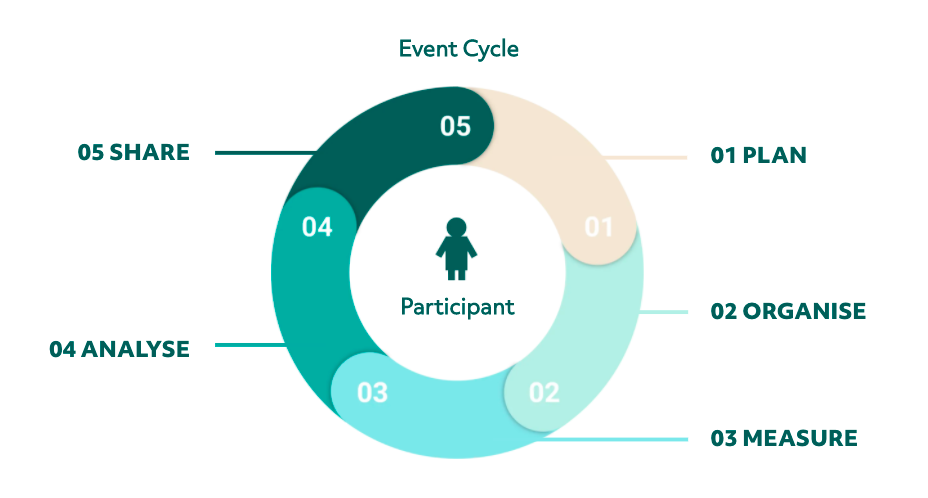What do all highly successful people, teams and organisations have in common? From the outside, it might seem like these individuals and communities are simply more fortunate or talented than everybody else, and sometimes that might be the case. However, we believe that the reasons typically go far beyond that. Successful people have most likely succeeded because they've set their goals high up and worked both systematically and for a long time to achieve those goals. Gradually, they've reached things that no one initially thought they would. This principle applies in most circumstances, whether you want to be the world's number one footballer or lead a prosperous business.
A systematic approach for more successful events
If a friend or colleague was to ask you how to become the best event organiser in the world, what advice would you give them? Would you give them your own best practices or recommend that they read event related blogs? Or would you suggest that they acquire new event management software that supposedly makes it more effortless to manage the type of events they're organising?
Our answer to the question would be straightforward; we'd tell your friend to do two things. First of all, we would encourage them to set an ambitious goal. (Or maybe they've already established this goal since they want to be the world's best event organiser.) Secondly, we'd tell them to make sure they learn as much as possible from each event they organise since continuous improvement ensures that they move closer and closer to their target. This kind of systematic process is something world-class athletes and performers follow to reach their goals, so why wouldn't it work in other circumstances as well?
"Successful people have most likely succeeded because they've set their goals high up and worked both systematically and for a long time to achieve those goals."
The process described above is something we call Event Success Management, and the core of its methodology is the Event Cycle. By following this methodology, you ensure that:
- both you and the events you organise improve continually and much faster than before
- your participants will value your events a lot higher
- you'll be more likely to reach your event goals
The five stages of Event Success Management
In Event Success Management, it's all about the participant. All action points revolve around maximising the participant experience because, in the end, it's the participant who decides how you did – was your event a success or not? The Event Cycle consists of five stages: Plan, Organise, Measure, Analyse and Share. Here's how they work:
1. Plan. Review the key findings from the previous Event Cycle, and set the goals and targets for your next event. Then, identify the ideal participant and set a realistic budget. Make sure to plan event facilities carefully: venue or channel, content, structure etc.
2. Organise. Organise the event as any other event, online or onsite. Cover all lifecycle stages from pre-event marketing to post-event follow up.
3. Measure. As soon as the event is over, measure its perceived value with Experience Value Score (EVS). Get fresh feedback straight from the participants and evaluate other event KPIs as well.
4. Analyse. Organise a retrospective. What went well? What could have gone better? What do you need to change to do better next time? Analyse your EVS score and feedback.
5. Share. Document your findings and share the results and action points with your colleagues to change the way you run events.

The five stages of the Event Cycle.
Why Event Success Management works
The power of Event Success Management rests upon the fact that you repeat the same systematic process in each event. As you try out new things and keep learning and evolving, each event will be more successful than the one before. By working systematically, you improve your operations, the participants are happier, and you're more likely to reach the goals you've set initially.
It's time for a new course of action and smarter events
Will anyone who starts applying Event Success Management and the Event Cycle become a world-class superstar? Will all your events from now on exceed all expectations simply because of this methodology? Obviously not. You can bank on it that you won't be a world-renowned event professional overnight, and some of your events will stay below their targets. Nevertheless, suppose you want to remain competitive and make sure participants will continue to invest their time in your events. Or maybe you're keen on joining an organisation with one of the most esteemed event teams in your area. In that case, this concept is your opportunity to learn and become more successful in your job. Event Succes Management is not so much about having the right tools as it is about an altered mindset and course of action. What do you say? Are you ready to jump on board?
"Event Success Management is not so much about having the right tools as it is about an altered mindset and course of action."
Be part of the movement and join the Event Success Community! Discuss and compare experiences and key learnings with other professionals passionate about creating continuously greater value for participants and other event stakeholders.
Similar articles

Future of Events 2024: What we learned from our flagship event

Event Analytics Tools: Key Features for Measuring Event Success

An Introduction to Event Tools: Everything You Need to Know

The Basics of Event Management: Everything You Need to Know to Get Started






